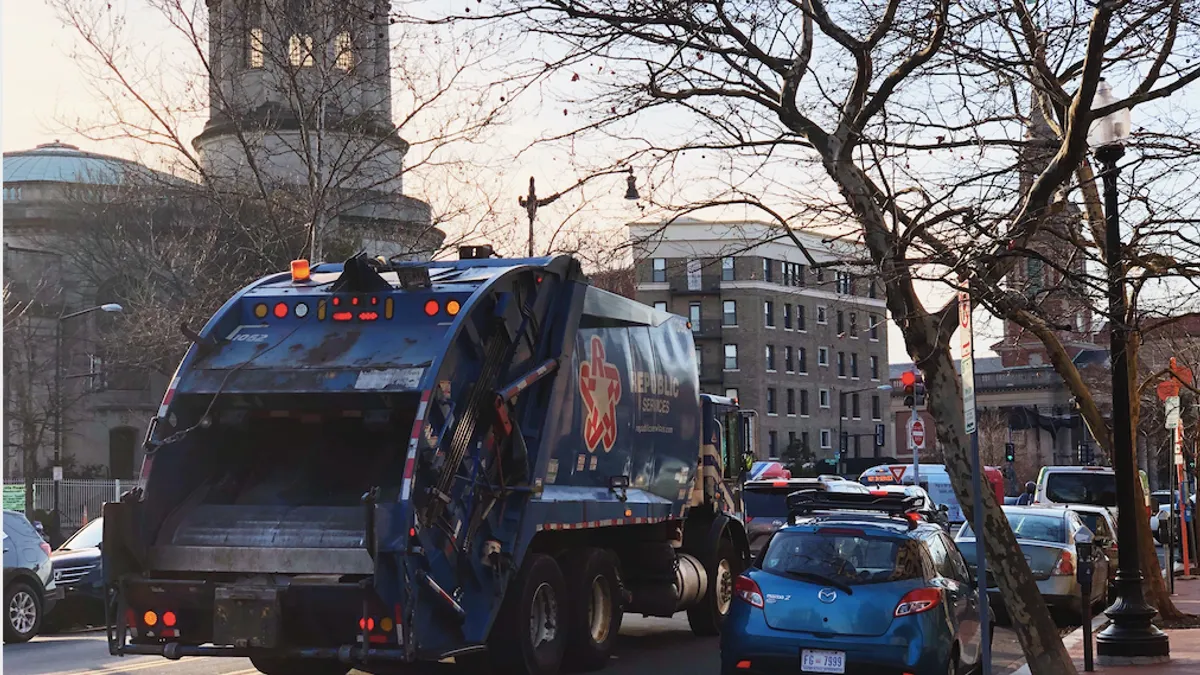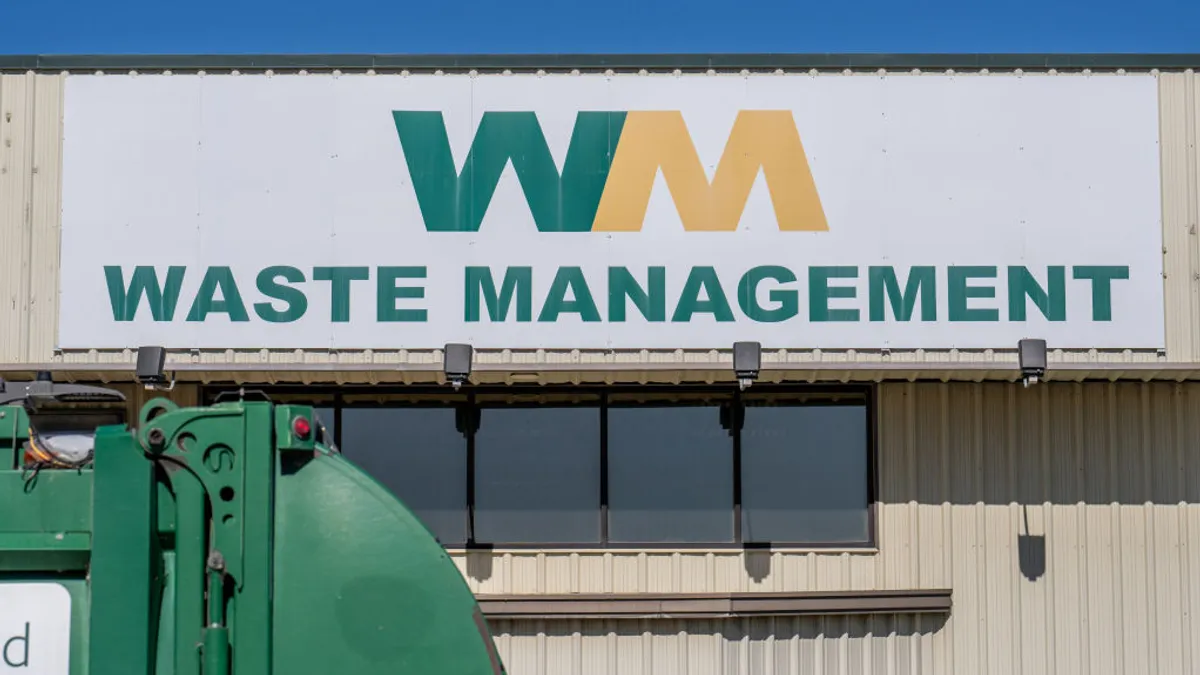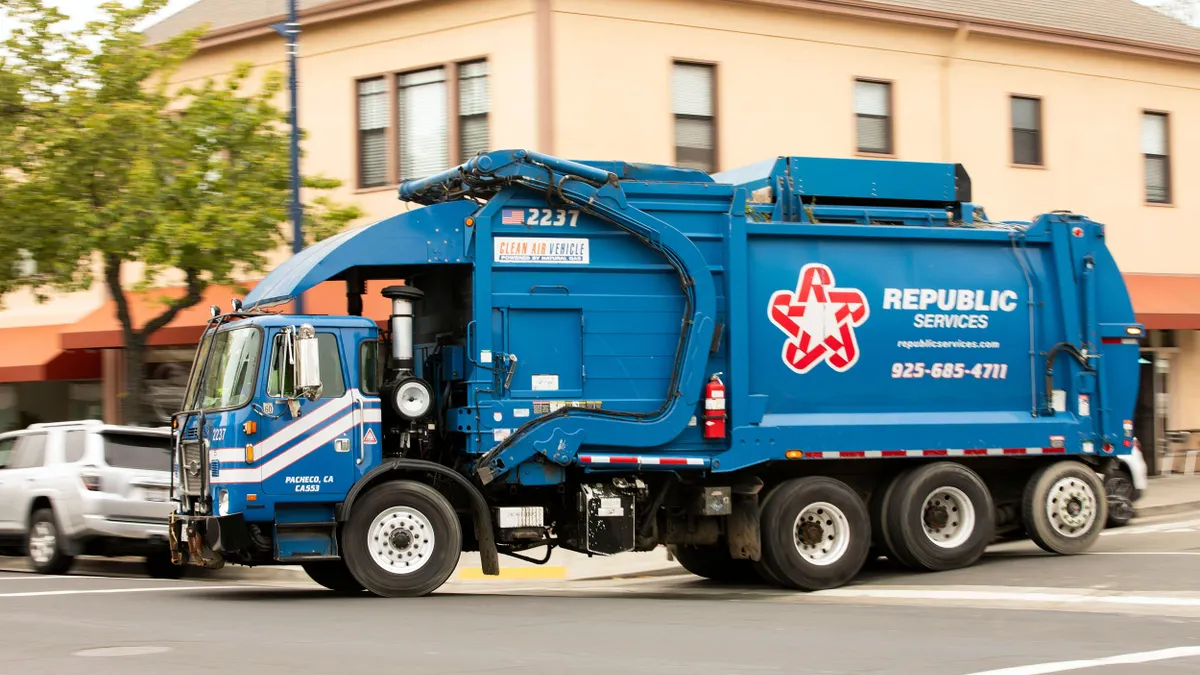Concerns about falling ill are growing among frontline waste and recycling workers as the coronavirus continues to spread. Their precarious state is opening up new questions about sick leave policies and the potential for exposure while on the job.
"The challenge is, you want employees to still feel safe," explained Jeffrey Landes, an employment attorney with the firm Epstein Becker Green.
Company size is playing a role in how employers navigate turbulence around COVID-19, Landes told Waste Dive. Larger businesses are somewhat better equipped to address issues like paid leave requests, either due to worker illness or if employees need to care for sick relatives.
Unions like the International Brotherhood of Teamsters have homed in on Waste Management and Republic Services, among others. Both waste giants have emphasized their efforts to provide personal protection equipment (PPE) and implement social distancing measures. Republic told Waste Dive it will provide an additional 10 days of paid leave for employees with COVID-19. Waste Management also confirmed it will continue paying employees for a 40-hour work week, after accounting for other relevant benefits, if they become ill.
As the two largest companies, those players could set the standard for bigger businesses, but their assurances may be harder to make for smaller operations.
"Most of our workers, if they don't work they don't get paid.... and their benefits are all dependent on hours worked," Dennis Desmond, business manager for the Laborers' International Union of North America (LIUNA), told Waste Dive. His union represents some industry workers with smaller entities.
The uncertainty around exposure risks to COVID-19 remains a serious issue for industry workers, given that research on the virus is in early stages. Initial research published in the New England Journal of Medicine last month found it can live on certain materials for up to three days, including plastics and stainless steel. Guidance from the U.S. Centers for Disease Control and Prevention (CDC) and the U.S. Occupational Safety and Health Administration (OSHA) maintains no elevated risk for employees interacting with those materials, but many workers are still concerned about the possibility of falling ill.
At least 240 sanitation workers in New York City had tested positive as of last Thursday, with additional confirmed cases elsewhere in New York as well as in Virginia. A supervisor in the Raleigh Solid Waste Services Department in North Carolina died recently from complications relating to COVID-19, the News & Observer reported last month. It is unclear how the individual contracted the virus and there has been no definitive link between any waste work and an employee becoming sick. But Raleigh solid waste employees have expressed concern and argued the city could be doing more to help protect them.
Another North Carolina city is taking steps to incentivize workers deemed essential and acknowledge their concerns. Tori Carle, a Greensboro waste reduction supervisor, told Waste Dive that collection workers may leave as soon as they finish their routes and still receive a full day's pay. Five additional sick leave days are also being provided, which workers can take now or later. For the pay period between March 30 and April 15, staff below the director level who are reporting to work in person are also offered 5% premium pay.
In Philadelphia, sanitation workers are among essential city employees who received 150% of their salaries during the first 11 days of the city's COVID-19 outbreak. That policy came to an end on March 29 and the city is working to broker new contract agreements, according to an April 1 story by the Philadelphia Tribune.
As cities take action, companies are also facing pressure. The Teamsters' letters, sent in mid-March to various CEOs, posed questions about safety and PPE access. Theofilos G. Galoozis, Waste Management's vice president for employee relations, responded to the letter laying out the company's commitment to implementing proposed CDC measures he said would "exceed obligations that exist under our collective bargaining agreements." The company also said it is increasing sanitation procedures and monitoring any changes in federal guidance, in addition to expanding paid sick leave policies.
"Waste Management will excuse COVID-19-related absences, and employees whose health is impacted by the coronavirus will receive up to 40 hours of weekly pay or may qualify for short-term disability," company spokesperson Janette Micelli confirmed to Waste Dive.
Chuck Stiles, director of the Teamsters' waste and recycling division, called the Waste Management response to the union's letter "not perfect," but a "good-faith effort" in a letter to the union shared with Waste Dive. He had more criticism for Republic, which did not initially respond to the letter it received. Republic did send out paid time-off guidelines to some Teamsters local chapters, but Stiles said a driver for the company in Georgia was suspended after voicing complaints about a lack of COVID-19 protections.
An unnamed spokesperson with Republic told Waste Dive in a lengthy statement the company is providing an additional two weeks off for employees sick with COVID-19 and noted OSHA's current guidance for waste workers. Like Waste Management, Republic said it is supplying more PPE and sanitizing supplies.
"Between the PPE and the fact that most drivers do not interact with customers or the general public for much of the work day because they are out driving, they are even less likely to be exposed to the virus through their jobs," the spokesperson said.
Kara Deniz, a spokesperson for the Teamsters, told Waste Dive local chapters have also been in talks with multiple other companies where its members work. Waste Connections, is offering a $2 national pay increase to frontline workers for an unspecified duration of time. Advanced Disposal Services told the union it is making no changes to time-off policies, but is altering procedures like using hand print clocks. Communications with Recology are ongoing, with a largely favorable response expected.
In contrast to bigger players, smaller companies are also dealing with new federal rules that directly apply to them. Under the Families First Coronavirus Response Act (FFCRA), employers with fewer than 500 employees must provide up to 80 hours of paid sick leave pertaining to COVID-19 at regular pay. Caring for another individual as a result of COVID-19 mandates up to 80 hours of sick leave at two-thirds of a worker's salary.
"Smaller businesses are probably going to be more impacted," explained Landes, the attorney. "[They're facing] a busier time from an HR compliance standpoint... larger employers only have to worry about some of the new state leave laws."
Like their bigger counterparts, smaller companies have taken similar steps regarding PPE and sanitizing when interacting with bins, trucks and facilities. But with thinner margins, expanded paid leave options may be more of a challenge. And workers have been reluctant to abandon their regular pay and benefits if they can help it.
"If you're out more than a month, you could lose your health insurance [and your] job might not be there for you if you come back," Desmond of LIUNA acknowledged.
One source of hope for those companies is the $2.2 trillion stimulus package signed by President Donald Trump last month. That relief effort will allow small businesses to take out loans to cover payroll and other expenses. Their employees, meanwhile, will largely be receiving individual checks or higher unemployment benefits.
Even during a difficult time, businesses still have some control over morale and how they shape messaging to employees. In addition to closely monitoring new regulations appearing at the state and federal level, Landes advised companies of all sizes to broadcast safety measures and to maintain transparency with their workforce.
"A priority is making sure you show the employee you take these issues very seriously," he said. "The health and welfare of your employees is paramount."
With additional reporting by Cole Rosengren

















